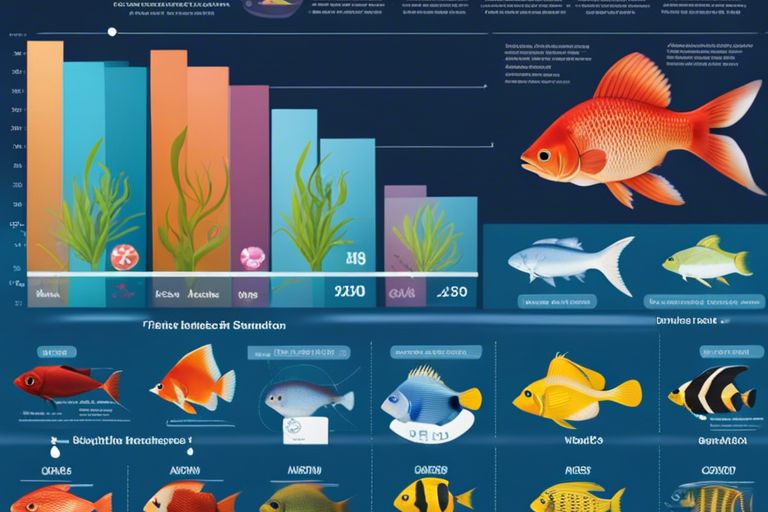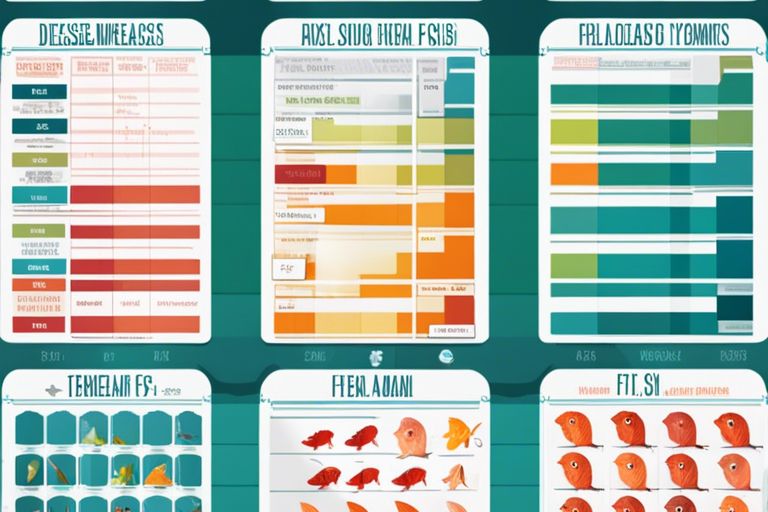Over the years, fish diseases have become a common concern for aquarium owners. Understanding the symptoms and effective treatment options is crucial in maintaining the health and well-being of your aquatic pets. In this comprehensive guide, we will explore the most common fish diseases, their causes, symptoms, and provide expert advice on how to diagnose and treat them effectively. Whether you are a beginner or experienced fish keeper, this guide will equip you with the knowledge to keep your fish happy and healthy.

Understanding Fish Diseases
Types of Fish Diseases
For a fish enthusiast, understanding the various types of diseases that can affect your aquarium is crucial. Some common fish diseases include fin rot, ich, swim bladder disease, fungal infections, and bacterial infections. It is vital to be able to identify the symptoms of these diseases early on to provide the appropriate treatment swiftly.
| Fin Rot | Caused by bacteria, leading to the deterioration of the fish’s fins |
| Ich | Caused by a parasitic protozoan, resulting in white spots on the fish’s skin and gills |
| Swim Bladder Disease | Caused by a variety of factors, affecting the fish’s buoyancy and ability to swim |
| Fungal Infections | Caused by fungal spores, appearing as white growth on the fish’s body or fins |
| Bacterial Infections | Caused by various bacterial strains, leading to symptoms such as lethargy and loss of appetite |
Any delay in diagnosing and treating these diseases can have severe consequences for the health of your fish and the overall balance of your aquarium.
Factors Contributing to Fish Disease
Some factors contribute to the development of fish diseases, and understanding them can help you prevent outbreaks in your aquarium. Poor water quality, overcrowding, inadequate nutrition, stress, and introduction of new fish without quarantine are common factors that can weaken the fish’s immune system and make them more susceptible to diseases.
- Poor Water Quality
- Overcrowding
- Inadequate Nutrition
- Stress
- Introduction of New Fish Without Quarantine
On top of these factors, it is crucial to regularly monitor your fish for any changes in behavior or appearance that could indicate a potential health issue. Any delay in addressing these contributing factors can make your fish more vulnerable to diseases.
Fish
As delicate creatures, fish are susceptible to various diseases that can quickly spread in an aquarium environment. It is vital for fish owners to educate themselves on the types of diseases that can affect their fish and the factors that contribute to their development. By being proactive in monitoring water quality, providing proper nutrition, managing stress levels, and quarantining new fish, you can create a healthier environment for your aquatic pets.

Diagnosing Fish Diseases
Step-by-Step Guide for Diagnosis
After observing unusual behavior or physical symptoms in your fish, it is crucial to accurately diagnose the underlying disease to provide appropriate treatment. The following table breaks down the step-by-step process for diagnosing fish diseases:
| Step | Action |
| 1 | Observation of fish behavior and symptoms |
| 2 | Research common fish diseases |
| 3 | Consult with a fish veterinarian |
| 4 | Perform diagnostic tests as necessary |
Tips for Accurate Diagnosis
Fish diseases can often present similar symptoms, making accurate diagnosis challenging. To ensure you pinpoint the specific issue affecting your fish, follow these tips:
- Observe multiple fish in the tank to check for widespread issues.
- Research common diseases based on observed symptoms.
- Consult with an experienced fish hobbyist or veterinarian for guidance.
You must gather as much information as possible and consider all potential factors that could be contributing to the fish’s illness. Assume that a thorough diagnostic approach is imperative for effective treatment.
Water
Water quality plays a crucial role in the health of your fish. Poor water conditions can weaken their immune system, making them more susceptible to diseases. Regularly test the water parameters and maintain proper filtration and water changes to ensure a healthy aquatic environment. Assume that pristine water conditions are vital for preventing and managing fish diseases effectively.
Treating Fish Diseases
Once again, treating fish diseases promptly is crucial to the well-being of your aquatic pets. Proper treatment can help alleviate symptoms, cure infections, and prevent the spread of diseases within your aquarium.
Treatment Options
For fish diseases, treatment options vary depending on the specific ailment. Common treatments include medications, water quality management, isolation of infected fish, and dietary changes. It is important to correctly identify the disease before starting any treatment to ensure effectiveness.
Pros and Cons of Treatment Methods
| Pros | Cons |
| Effectively targets specific diseases | Some medications may be harsh on fish |
| Can provide quick relief | Overuse of medications can lead to antibiotic resistance |
| Improves overall fish health | Some treatments may stress fish |
To ensure the best outcome when treating fish diseases, it is imperative to consider the pros and cons of different treatment methods. By weighing the advantages and disadvantages, you can make an informed decision that prioritizes the health and well-being of your aquarium inhabitants.

Maintaining Healthy Aquatic Environments
Best Practices for Disease Prevention
Despite your best efforts, fish diseases can still occur. However, there are several best practices you can implement to significantly reduce the risk of disease in your aquatic environment.
Advanced Tips for Long-term Fish Health
Even the most seasoned aquarists can benefit from advanced tips to ensure the long-term health of their fish. These tips go beyond the basics and can help you create the optimal conditions for your aquatic pets to thrive.
- Practices to Maintain Water Quality:
Practices to Maintain Water Quality: When considering long-term fish health, one of the most critical factors is water quality. Fish are highly sensitive to changes in water parameters such as pH, ammonia, nitrite, and nitrate levels. Regular testing and maintenance of these parameters are vital to prevent stress and disease in your fish.
- Fish Diet and Nutrition:
Fish Diet and Nutrition: Providing a well-balanced diet tailored to the specific nutritional needs of your fish species is crucial for their long-term health. Different species have varying dietary requirements, so it’s vital to research and provide appropriate food to ensure your fish receive all the vital nutrients they need to stay healthy.
Conclusion
So, understanding the various factors that contribute to fish diseases and how to diagnose and treat them is crucial for every fish keeper. By following the comprehensive guide provided, fish enthusiasts can ensure the health and well-being of their aquatic pets. Keep in mind, early detection and prompt treatment are key to preventing further spread of diseases and maintaining a thriving aquarium ecosystem. With diligence and the right knowledge, you can provide the best care for your fish and enjoy a beautiful and disease-free aquarium.
FAQ
Q: What are common signs of fish diseases?
A: Common signs of fish diseases include abnormal swimming behavior, loss of appetite, fin deterioration, discoloration, and abnormal growths on the body.
Q: How do I diagnose fish diseases?
A: To diagnose fish diseases, closely observe your fish for any abnormal behavior or physical symptoms. You can also consult with a veterinarian or an experienced aquarist for proper diagnosis.
Q: What are some preventive measures against fish diseases?
A: Preventive measures against fish diseases include maintaining good water quality, avoiding overcrowding, quarantining new fish before introducing them to your tank, and providing a balanced diet for your fish.
Q: How can I treat fish diseases?
A: Treatment for fish diseases varies depending on the specific disease. It may include using medications, water treatments, adjusting water parameters, and isolating infected fish to prevent the spread of the disease.
Q: Can fish diseases be contagious?
A: Yes, some fish diseases can be contagious and spread rapidly among the fish in your aquarium. It’s important to isolate infected fish and take necessary precautions to prevent the disease from spreading.
Q: Are there specific medications for treating fish diseases?
A: Yes, there are specific medications available for treating various fish diseases. It’s imperative to identify the specific disease affecting your fish before selecting the appropriate medication for treatment.
Q: When should I seek professional help for fish diseases?
A: If you are unsure about the diagnosis or treatment of fish diseases, it is advisable to seek help from a veterinarian specializing in aquatic animals or an experienced aquarist. Professional help can ensure proper diagnosis and treatment for your fish.











